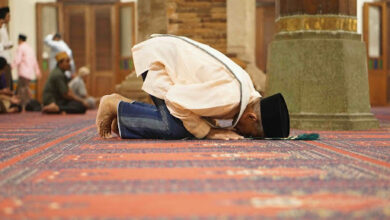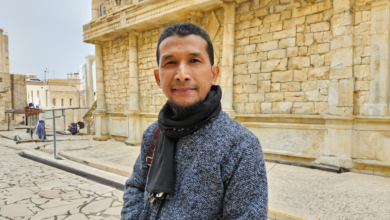
DDHK.ORG - Best friend characteristics:
- Tsiqoh, means to believe. Friends always believe in the teachings brought by the Prophet.
- Muhajahadah, meaning to be serious. They always mean to do good.
- If something goes wrong, friends are patient and trustworthy.
- Not afraid of anyone.
- Willing to sacrifice.
Verse about friends, Surat Ali Imran, verse 92: “You may never come to virtue (which is perfect), until you spend part of the wealth that you love. And whatever you supply then verily Allah knows. "
The story of Sha'ban
The majority of friends, in droves, wanted to stay close to the Prophet. However, there was a friend who was not too prominent from the other friends, who chose to stay far away from the Messenger of Allah.
His name is Sha'ban. His house is a three hour walk to the Nabawi mosque and the house of the Prophet. Even though it was far away, Sha'ban never missed the congregational prayer with the Prophet. In fact, often came earlier than other friends.
The story of Sha'ban walking on foot was heard by Ubay bin Ka'ab, a former priest who converted to Islam. He also advised Sha'ban to buy a donkey. However, the words of Sha'ban shocked Ubay bin Ka'ab.
He said, "By Allah, I am not happy if my house is near the Messenger of Allah. I prefer to live in a house far from his house. "
He also conveyed the words of Sha'ban to the Messenger of Allah. When asked by the Prophet Muhammad about the reason, Sya'ban revealed that once the Prophet Muhammad had said that every step of a person who goes to the mosque one sin will be forgiven or his degree will be raised one level. So, his wish to stay far away from the Prophet Muhammad was none other than so that the number of his steps towards the Nabawi mosque was greater.
Sha'ban has unique habits. Every time he prayed in congregation, he always took the most corner position in the Nabawi mosque. One morning the Messenger of Allah was surprised when he did not find Sha'ban in his position.
He also asked, "Have any of you seen Sha'ban?" But none of the friends saw it.
Until the Fajr prayer was over, Sha'ban could not be seen. Rasululullah saw and his companions finally went to visit Sha'ban's house. Arriving at Sha'ban's house, the Prophet and his companions learned the reason for Sya'ban's absence from Fajr in the congregation. None other than, because Sha'ban has passed away.
Sakaratul maut Sha'ban
Sha'ban's wife told me that there was something strange about before Sha'ban died. He shouted, saying 3 things:
- Ouch, if only it was further.
- Ouch, if only new.
- Ouch, I wish everyone.
The Messenger of Allah also delivered the word of Allah, Surah Qaf, verse 22: "Surely you are in a state of neglect from this (thing), then We reveal from you that the cover (which covers) your eyes, then your vision on that day is very sharp."
From this verse it is revealed that a person who is facing sakaratul maut will have a vision that cannot be seen by many people. Namely, related to the deeds of life.
"Ouch, if only it was further", shouted Sha'ban, related to the great reward for his long journey to the mosque for congregational prayers.
"Ouch, if only new", which Sha'ban shouted was related to the two layers of clothes he was wearing because the weather was very cold. On the way, he met someone who was moaning cold. He also gave a piece of clothes that were more worn out, which he wore on the outer layer. Allah shows a very big reward when Sya'ban sakaratul maut.
"Ouch, if only everyone," shouted Sha'ban in connection with his alms to a beggar who knocked on his door and claimed to be starving. without thinking, Sya'ban also split the bread in half and halved his milk, enjoyed together. Allah also shows a great reward when Sya'ban sakaratul maut.
Lessons from the story of Sha'ban
"And say: 'Work you, then Allah and His Messenger and the believers will see your work, and you will be returned to (Allah) Who Knows the unseen and the real, and He will tell you what has been done. you do. " (Surah At-Taubah, verse 105)
Allah commands us to work, without expecting anything in return from humans. No matter how small the deeds we do, Allah knows and will reward them with rewards.
...
By Ustadz Hardy Agusman, this was conveyed at the study of Online Migrant Madrasahs, Saturday, March 13, 2021.
>>Follow the study of Madrasah Perantau Online on the Facebook page Dompet Dhuafa Hong Kong every Saturday. [DDHK News]



